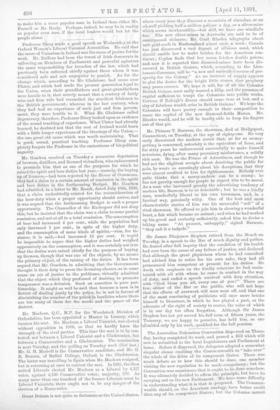Mr. Goseben received on Tuesday a numerous deputation of brewers,
distillers, and licensed victuallers, who endeavoured to persuade him that as one of the purposes for which he raised the spirit and beer duties last year,—namely, the buying up of licences,—had been rejected by the House of Commons, they had a claim to a certain amount of remission in the spirit and beer duties in the forthcoming Budget. Mr. Goschen had admitted, in a letter to Mr. Rasch, dated July 10th, 1890, that a claim undoubtedly existed for the reconsideration of the beer-duty when a proper opportunity should arrive, and it was argued that the forthcoming Budget is such a proper opportunity. The Chancellor of the Exchequer did not deny this, but he insisted that the claim was a claim to some partial remission, and not at all to a total remission. The consumption of beer had increased 4 per cent., while the population had only increased 1 per cent., in spite of the higher duty, and the consumption of some kinds of spirits,—rum, for in- stance, it is said,—had increased 12 per cent. It would be impossible to argue that the higher duties had weigted oppressively on the consumption, and it was certainly not true that the duties were raised chiefly for the purpose of buying up licences, though that was one of the objects, by no means the primary object, of the raising of the duties. It has been argued that Mr. Goschen, in admitting that the Government thought it their duty to press the licensing clauses, as in some sense an act of justice to the publicans, virtually admitted that the object which they professed of desiring to promote temperance was a delusion. Such an assertion is pure par- tisanship. It might as well be said that because a man is in favour of dealing justly by the police, he is not in favour of diminishing the number of the police in localities where there are too many of them for the needs and the peace of the district.


































 Previous page
Previous page